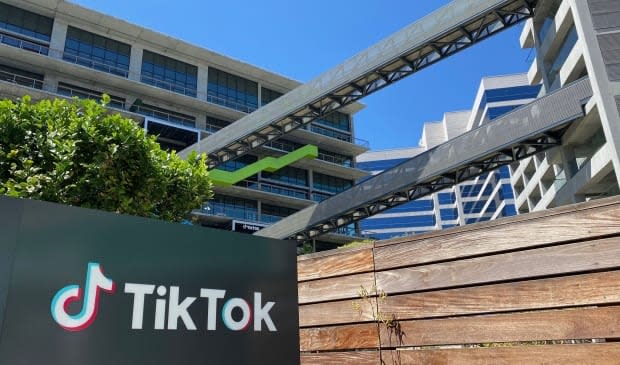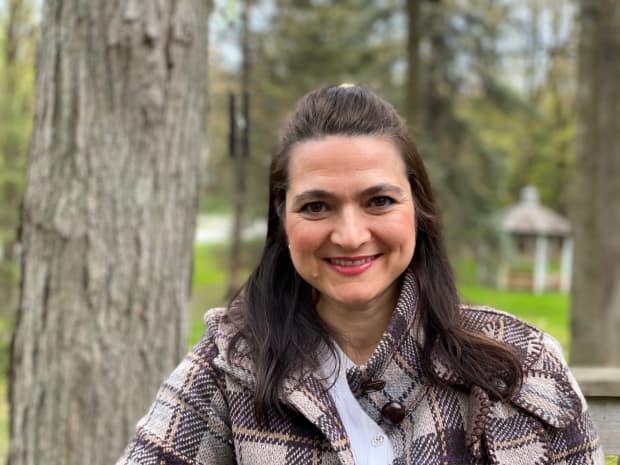Why a Canadian voice actor is suing social media giant TikTok's parent company

Bev Standing makes a living off her pipes, doing voice work for commercials, corporate videos, voice mail systems and more.
Those tracks are often made in a recording booth inside her bungalow in Welland, Ont., but she says her voice is also being heard around the world in countless videos on the social media platform TikTok.
Standing says TikTok is using recordings of her voice without permission, so she's suing its parent company, the China-based ByteDance, in a U.S. court for violating her copyright to her voice.
"This is my livelihood. This is what I do day in, day out, weekends, all day," Standing said. "And for you to just take my voice and do what you want with it, that's not right."
If Standing's claim is true but she's unable to get a settlement or loses in court, legal experts worry that voice actors will have trouble preventing their work from being taken for nothing.
"If this one slips, then you almost eradicate the industry," said Pina D'Agostino, an expert in copyright law who's an associate professor at York University's Osgoode Hall Law School in Toronto.
"You could say that everything's free for the taking."
TikTok's parent company estimated to be worth $400B
The lawsuit was filed in early May in the United States District Court for the Southern District of New York.
CBC News asked TikTok about the case, but the company did not comment.
TikTok allows users to post and share videos, from 15 seconds to a minute in length, about all kinds of things — from dance and fashion to education and social issues.
TikTok, which has offices in the U.S., is wildly popular especially with young people.
Launched in 2016, it has almost 690 million users worldwide and its parent company was recently estimated to be worth almost $400 billion US.
By contrast, Standing has a fraction of the power.
WATCH | Lawsuit pits social media giant against Canadian voice actor
After taking a weekend course on voice work in 2008, she was gradually able to turn it into a career and make it a full-time job by 2014.
"I'm a freelance employee of one up against a huge conglomerate," she said.
"It's completely overwhelming, but I don't have a choice."
How she says events unfolded
According to Standing, she somehow became the voiceover for TikTok videos after the company launched a new feature on the app that became a viral hit.
In fall of 2020, TikTok debuted a tool that converts text typed by a user into a voice, which is then played over videos.
Standing says for users who try the text-to-speech feature in North America, the app automatically adds a computer-generated version of her voice to their video.
I'm a freelance employee of one up against a huge conglomerate. It's completely overwhelming, but I don't have a choice." - Bev Standing, voice actor
Standing, says the first time she saw a TikTok video that used her voice was when a friend living in Portugal sent her one late last year.
Then she says her daughter found a video, followed by her stepdaughter.
"And then everyone started sending me these videos going, 'This is you, this is you,'" Standing said. "And that's how I found out."
At first, she says, she thought it was cool, but then she began to worry about how often it was happening.
She says she found out that some users were using the feature to voice crude language or offensive statements, which she finds upsetting and a threat to her reputation.
"My brand is very clean. I don't say things that I don't agree to, I don't swear," Standing said. "You know, I want to be the brand of some big product. And they might not take me now because of this."

Standing says she believes she knows how her voice came to be used this way.
In 2018, she says she was hired to do recordings for the Institute of Acoustics, a research organization of the Chinese government.
The job was simple but sizable.
"I had to read English sentences, thousands and thousands of English sentences that were going to be dissected for translation."
Standing and her lawyer believe these recordings somehow came into TikTok's possession and are being used as source voice to generate the text-to-speech narration.
The legal issues and what she wants
Standing's lawyer, Robert Sciglimpaglia, who is based in Connecticut, says his client has never given anyone permission to use her voice the way they claim it's being used by TikTok.
At the heart of the case are the claims that Standing "has suffered significant injury and irreparable harm" and that TikTok is "depriving [her] of the ability to control her reputation."
Because Standing claims her voice is being used in TikTok ads for companies such as McDonald's, Sciglimpaglia says his client is also being deprived of a potential lucrative contract.
"If she really was going to be the voice of McDonald's on TikTok, it could be a six-figure job, depending on how many spots they record," he said.
Standing, who wants TikTok to stop using her voice, is seeking both compensatory and punitive damages.
For compensation, Sciglimpaglia says that "the maximum penalty is $150,000 US per infringement," but without access to TikTok records, they can't tell how many times Standing's voice may have been used.
He says he contacted TikTok to negotiate a settlement before filing the case, but "TikTok has completely ignored us."

D'Agostino, the copyright expert at Osgoode, said she's worried TikTok could drag the case out.
"They have an army of lawyers behind them. What they'll argue is that they're within their rights, what they've done is completely lawful."
But she says ByteDance might be inclined to settle because of the bad optics of going up against Standing.
If Standing proves it's her voice, D'Agostino said, her right to control her likeness in the form of her voice would be violated, and she could likely show it's causing her harm.
If the case were being argued in Canada, Standing could lean on another legal principle, something known as moral rights. In Canada, Standing would have a moral right to be recognized for her voice, "essentially her right to be connected to the authenticity and integrity associated with her work," D'Agostino said.
In the U.S., moral rights are more limited in scope.
For her part, Standing wants TikTok to be "accountable for using my voice without permission, whatever that looks like." She also wants "other companies big and small to know you can't do this. There's repercussions."
WATCH | Ontario voice-over actor who became voice of TikTok now warning others

 Yahoo Movies
Yahoo Movies 